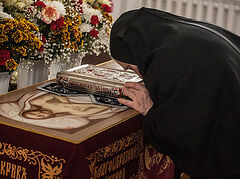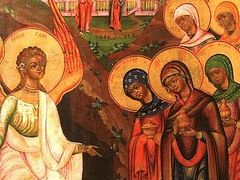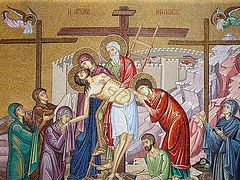Today, during the Liturgy, the Holy Church already spoke to us in its Gospel reading about the Resurrection of Christ. First an angel announced this joyous news to the Holy Myrrh-bearers, and as they were walking away from the tomb, the Resurrected Lord Himself appeared to them and said: “Rejoice.”
One can imagine what great joy the Myrrh-bearers experienced, and then all the disciples of Christ, at receiving the news of the Resurrection, especially after the great shame on the Cross, after the severe suffering and death endured by the Lord Whom they loved so much. This joy was so vast that the Apostles didn’t believe the Myrrh-bearers when the latter told them about the Resurrection of Christ. Some of the Disciples couldn’t even believe their own eyes for joy when Christ appeared to them after His Resurrection. Not only the Holy Myrrh-bearers and the Apostles experienced this joy from the Risen Lord’s appearance to them. Many of the great righteous ones living after the Apostles also experienced it, by virtue of the immutable words of Christ: He that loveth Me shall be loved of My Father, and I will love him, and will manifest Myself to him (Jn. 14:21).
This joy was also experienced by our great God-pleaser St. Seraphim of Sarov when he was only twenty-six, that is, when he had not yet been cleansed from all the passions, but had only a fiery determination not to betray Christ in his life, but to belong to Him with all his being. The blessedness of the Lord’s appearance to him in glory was so great that he couldn’t move from his spot after this wonderful Divine revelation to him, couldn’t speak a single word for several hours, and his heart melted from the blessedness of Paradise.
However, the word “Rejoice” spoken to the Myrrh-bearers includes not only the wondrous joy from the appearance of the Risen Lord—this word also speaks to us about another great joy that the Myrrh-bearers, Apostles, and all Christians should have. This joy comes from the inner regenerating grace of the Holy Spirit, which the Apostles received on the fiftieth day after the Resurrection of Christ, and which began to be communicated to all Orthodox believers in Holy Baptism, in the Mystery of holy Chrismation. We don’t immediately feel joy from this grace, but it gradually reveals itself in us together with grace, according to the measure of our fulfillment of the holy commandments of Christ, as St. Niketas Stethatos teaches in The Philokalia, and other Holy Fathers.
Having revealed this grace, holy people became like gods on earth through their holy lives and like them experienced the unceasing joy of the Heavenly Kingdom. This is how St. Anthony the Great speaks of this beatitude: “I prayed for you to receive that fiery Spirit, Whom I have. But first, offer bodily labors and humility of heart, and this Holy Spirit will be given to you. And when He comes and makes His abode in you, He will drive away the fear of men and beasts. He will reveal the highest Heavenly mysteries to you, and you will have Heavenly joy day and night, and you will be, in this body, like those who are already in the Heavenly Kingdom of Christ.”
This is why the holy Apostle Paul called the regenerating grace of the Holy Spirit that we receive a pledge of the future inheritance (Eph. 1:13-14), that is, of the eternal blessedness of the Kingdom of Christ. We can’t feel this great blessedness, this immense Divine joy in all its fullness now. Therefore, the Lord gives us the chance to have just a foretaste of it. We don’t receive all the blessedness now, but only part of it—the pledge that is the grace of the Holy Spirit.
And this is still not all the Christian joy that is contained in the word of the Risen Christ, “Rejoice.” It also points us to that great joy that we receive from communing of the Body and Blood of Christ. Of course, not everyone experiences such fruits of grace in their soul from this terrible and wonderful Mystery. This joy is felt by those who approach the chalice with the Body and Blood of Christ with true repentance, that is, with deep heartfelt contrition for their sins and with an unyielding determination not to return to their former sins. This joy is felt by those who always remain in humility and steadily observe all the Divine commandments, becoming like the angels in their chaste purity and their meekness. With such a holy life, truly faithful people are illuminated by the Divine Light from receiving the Most Pure Mysteries, are united with God by grace, are deified, and experience the blessedness of Paradise. Then the Lord gives them to taste this supreme and greatest good that the Prophet Isaiah foretold and to which the Apostle Paul testified: Eye hath not seen, nor ear heard, neither have entered into the heart of man, the things which God hath prepared for them that love Him (1 Cor. 2:9, Is. 64:4).
Undoubtedly, the word “Rejoice” also includes that paradisiacal blessedness that we will experience in all its fullness in the future life, after the General Resurrection and the Dread Judgment of Christ. We can’t even imagine this blessedness now. It doth not yet appear what we shall be, says St. John the Theologian, but we know that, when He shall appear, we shall be like Him; for we shall see Him as He is (1 Jn. 3:2). This is why St. Seraphim of Sarov, personally experiencing a foretaste of this future beatitude of Paradise, said, “Even were we to face the most terrifying and very prolonged sufferings, we must readily agree to endure them, only not to lose that great unspeakable joy and beatitude that the Lord has prepared for all who love Him.” How could it be otherwise, when the holy Apostle Paul, having experienced the blessedness of Heavenly dwellings and constantly enduring all sorts of severe tribulations on earth, said, The sufferings of this present time are not worthy to be compared with the glory which shall be revealed in us (Rom. 8:18).
These are the Christian joys or Heavenly beatitudes about which the Divine word, “Rejoice,” speaks to us. This word also tells us that all these joys are our property, because they were given to us by the Resurrection of Christ.
The holy Apostle Paul said that if Christ be not raised … we are of all men most miserable (1 Cor. 15:17, 19). Clearly, by virtue of the Resurrection of Christ, we are the happiest people in the world.
Yes, we experience many, many sorrows. But let no sorrows overshadow our Christian joys, stemming from the Resurrection of Christ. The Risen Lord knew what great sorrows the Holy Myrrh-bearers, Holy Apostles, and all of His true followers lived and would live. And despite this, He told them all, “Rejoice.” Let us never forget that Pascha is deliverance from sorrow.
By virtue of His Resurrection, the Lord has given us the ability to rejoice even in sorrow, and to find the source of our consolation, our joy in even the deepest sorrows. This is why the holy Apostle Paul said, As the sufferings of Christ abound in us, so our consolation also aboundeth by Christ (2 Cor. 1:5). Let us only love Christ, as the Holy Myrrh-bearers, the Disciples, and all His true followers loved Him. After all, for the love of Christ, He appeared to them, gladdening and comforting them with His appearances. Let us also love Christ; that is, let us faithfully fulfill His will, His Divine commandments. Then the Risen Lord, according to His promise, will appear to us or will show His ineffable mercy. Then He will abide with us, with all the joys of His bright Resurrection. For immutable are His Divine words : I am with you always, even unto the end of the world (Mt. 28:20).




